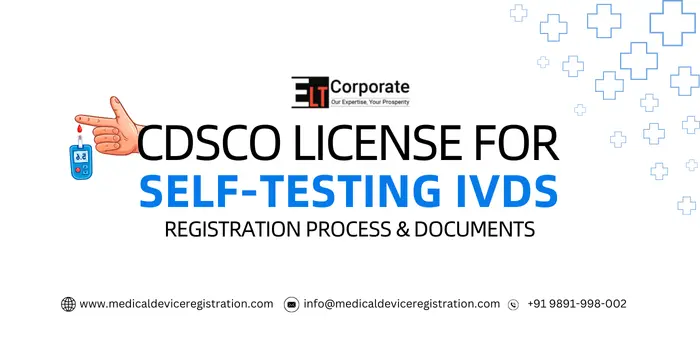Navigating the landscape of medical regulation can be haunting, especially for those interested in self-testing IVD diagnostics in India. The interval of the integral CDSCO license for Self-Testing IVDs is a critical requirement for manufacturers and distributors who wish to market self-testing IVDs. This article will help you to clarify all the complexities of obtaining this license, addressing common concerns and questions to help you understand the process and its significance.
What Is Self-Testing IVDs?
The self-testing IVDs are diagnostic devices that allow everyone to test themselves for some specific medical issues or diseases outside the clinics. These IVD devices are designed by laypersons “non-healthcare professionals” without special training or assistance. These devices can be used in the workplace, or any kind of non-clinical environment.
What is the CDSCO License for Self-Testing IVDs?
The integral CDSCO license is a regulatory approval granted by the central drug standard control organization also known as CDSCO in India. It ensures that self-testing IVD needs the necessary safety and efficiency standards before being marketed. This license is crucial for ensuring public health and safety, as it regulates the quality of diagnostics tests available to consumers.
Why Do You Need the CDSCO License for Self-Testing IVDs?
The integral CDSCO license is essential for legal compliance. Without it, manufacturers cannot market their products in India. Moreover, having this license enhances credibility and consumer trust. It assures users that the products they are using are safe and effective for self-diagnostics.
How Does Process Work For CDSCO Self-Testing IVDs License?
The process involves several steps, including documentation, testing, and application submission. Manufacturers must provide data on product efficacy and safety. Following a thorough evolution by CBSCO, this license may be granted, allowing the manufacturers to sell IVD in the Indian markets.
Where Can You Find Guidance To Apply License For Self Testing IVDs?
The CDSCO official website field guidelines on the application process. Additionally, industry associations and consultancy firms provide resources to help navigate the regulatory landscape. These resources can simplify the process and ensure all requirements are met.
When Should You Apply CDSCO License For Self-Testing IVDs Devices?
Timing is critical when applying for the integral CDSCO license. It is advisable to start the application process as early as possible to avoid any kind of issues. Delays in obtaining the license can affect product launch dates and market access.
Who Can Apply for a CDSCO License for Self-Testing IVDs?
Any manufacturer of self-testing IVD can apply for the license. However, they must ensure that their products comply with the relevant regulations. This includes demonstrating that the tests are reliable and safe for consumer use.
What Are the Key Requirements for Obtaining the License For Self Testing Devices?
To obtain the integral CDSU license, manufacturers must meet several key requirements. These include submitting product data, clinical trial results, and quality control measures. Each application undergoes rigorous scrutiny to ensure compliance with health standards.
Which Types of Self-Testing IVDs Require a CDSCO License?
The CDSCO requires a license for various self-testing IVD. These include blood glucose monitors, pregnancy tests, and COVID-19 self-test kits. Understanding which product falls under the regulation is important for all manufacturers.
How Long Does the CDSCO Licensing Process Take For IVDs Devices?
The duration of the licensing process can be different from others. On average, it may take several months, depending on the completeness of the application and the thoroughness of the review process. Patience and diligence are essential during this. full stop
What Happens if Your Application is Rejected For CDSCO License?
By any chance if your application is rejected, you will receive feedback outlining the reason for the rejection. Manufacturers can address these issues and reapply. Understanding the feedback is key to successful resubmission.
How Can You Ensure Compliance Throughout the Process Of CDSCO Registration For Self-Testing IVDs?
To ensure compliance, manufacturers should familiarize themselves with CDSCO guidelines; regular audits and quality checks can help maintain standards. Consulting with experts in regulatory affairs can be helpful for the manufacturers.
Conclusion
Understanding the integral CDSCO license for self-testing IVD in India is important for manufacturers looking to enter the market. This license not only ensures compliance but also fosters consumer trust. By following the guidelines and being proactive in the application process, you can navigate the complexities involved and achieve successful market entry.
FAQs [Frequently Asked Questions]
What is the Integral CDSCO License?
It is a regulatory approval for self-testing IVD, ensuring safety and efficiency for consumers.
Why is this license important?
It guarantees compliance with health standards and enhances consumer trust.
Who is eligible to apply?
Any manufacturer of self-testing IVD can apply for this license.
What types of IVDs require this license?
Self-testing kits like blood glucose monitors and pregnancy tests require licensing.
How long does the application process take?
The process can take several months, depending on application completeness.
What are common reasons for application rejection?
Incomplete documentation of failure to meet safety standards are common issue.
Can you appeal a rejected application?
Yes, you can address feedback and reapply.
Where can I find application guidelines?
The CDSCO official website provides detailed guidelines.
What documents are required for the application?
Manufacturers must submit product data, clinical trial results, and quality control measures.
Is there a fee for the application?
Yes, there is typically an application fee that varies based on the type of product.
How can I stay updated on regulations?
Regularly check the CDSCO website and follow industry news for updates on regulations.


Comments are closed